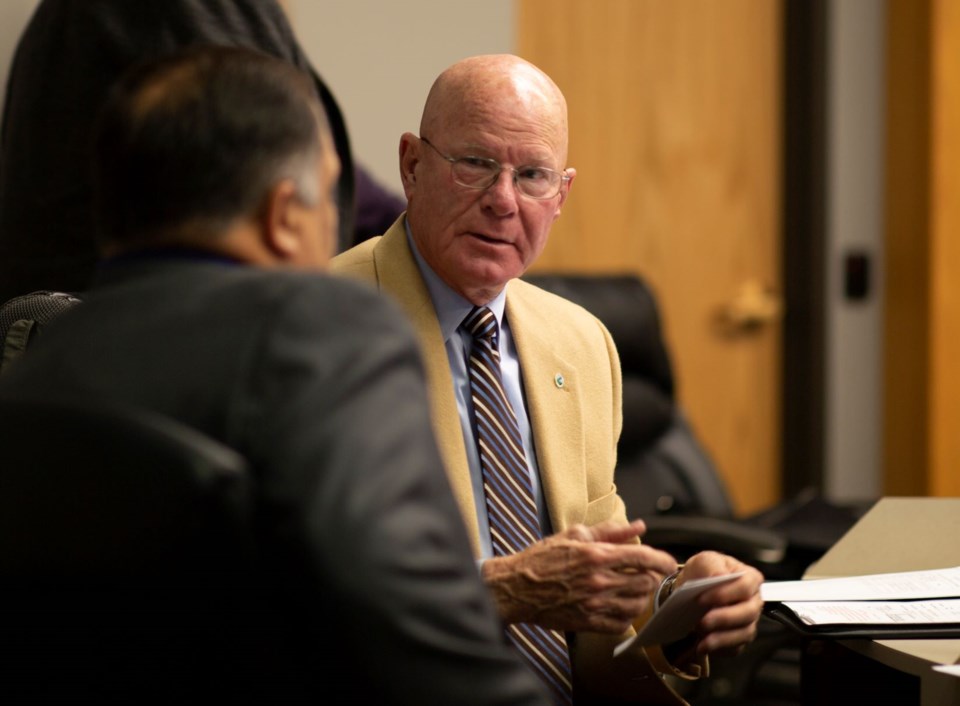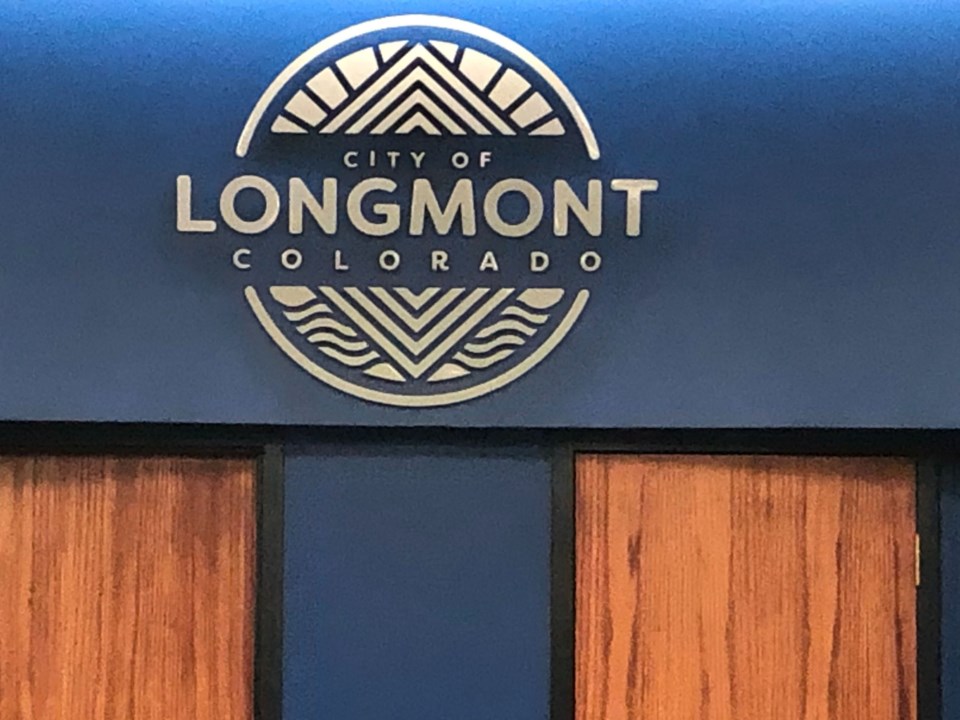In advance of the calendar turning to 2021, The Longmont Leader on Monday reached out to Longmont City Council members asking them to highlight their top priorities for the coming year. Although the request was sent to all seven council members, only Polly Christensen, Marcia Martin and Tim Waters responded.
Here are the issues on which they plan to focus in the year ahead:
Polly Christensen
 Longmont City Councilmember Polly Christensen talks about learning from pandemics in a video posted April 29, 2020. By Screenshot/YouTube video (https://bit.ly/3515iUt)
Longmont City Councilmember Polly Christensen talks about learning from pandemics in a video posted April 29, 2020. By Screenshot/YouTube video (https://bit.ly/3515iUt)Housing
Everyone in Longmont needs a home. A home is not just a roof over your head, but something that is stable and decent. Without that, nothing else in life (job, planning, relationships, prosperity) is possible.
I will continue to try to improve Longmont’s 12% affordable housing ordinance to better serve where the need is greatest; protect and maintain the housing stock we do have; and seek to work with good developers who share Longmont’s values to provide a true range of decent housing types and prices.
I will continue to resist excess short-term rentals (which change houses that families could buy and build lives in to overnight stays for tourists); resist gentrification (which leaves no room for young people, low-income or the elderly to live in Longmont); reclaim abandoned houses; continue to uphold Longmont’s 2008 ban on residential metro districts; continue to explore different financing and building options such as cooperatives, land trusts, modular housing, etc.
Civil rights
Hate crimes have dramatically risen nationally and even locally in the last four years. We must all look into our hearts and listen deeply to those who have been so damaged by bigotry. This is the time to educate and change the direction of our community and our nation so we have a true democracy, a thriving civil society, and genuine opportunities for all.
Sustainability
Moving forward we must do everything we can to provide our grandchildren an earth as beautiful and abundant as the one we inherited. We must stop just taking from the earth and put an equal amount back through recycling, composting, carbon sequestration, reducing use of plastics to far, far less; transitioning to renewable energy, building our homes, factories, and offices more efficiently.
Recovering from COVID-19
First, of course we must recover physically, financially and psychologically from the damage caused by COVID-19. The fiscal damage is enormous, both on a personal level and for nearly every business, locally and nationally. That will require Longmont government, businesses and individuals to cooperate selflessly for the better of our community and our nation.
Yes, selflessly for the greater good. I know we have it in us.
Marcia Martin

The right to a roof
In 2018, Longmont enacted a policy to create affordable housing, which accelerated the number of low-priced housing units planned for our city. 2021 will see the first fruits of this new policy. On council, I insisted on seeing this policy make economic sense. It has.
2020 revealed other weaknesses than supply in our plans to help Longmont’s workers and families find and keep homes. We have more rental assistance funding overall than ever before, but it isn’t easy for people of limited means to find the right path to accessing services. We need a “no wrong door” system for housing assistance that’s cooperative among the city, the county and the state.
There’s a shortage of temporary and transitional housing. Longmont needs to make exiting homelessness easier as well as preventing it. But we must recognize that transients will always be with us and design our city to minimize conflicts between transients and permanent residents, making Longmont a safer place for both.
Focus on public safety
In 2020, events drew the public’s eye toward policing in the United States. While Longmont has been practicing humane community policing for many years, we must keep improving. Following Chief Butler’s retirement, our city manager is conducting a nationwide job search to recruit the right leadership for our public safety organization, soliciting public input on what public safety means in Longmont.
The pandemic raised new concerns about how Longmont’s housed and unhoused communities coexist, especially regarding using outdoor public amenities while indoor amenities are closed. All these are matters of public safety. Council must exercise oversight on how we improve public amenities and public services both.
21st century energy
In 2020, dedicated Longmonters worked on planning our part fighting climate change. I was the council liaison to the Climate Action Task Force. Now it’s time to act on that plan. In my private sector career I focused on the renewable energy roadmap. Public utilities for generating, transmitting, and distributing electricity generally prefer to be followers rather than leaders. I will keep fighting to make sure that Longmont and Platte River Power Authority take the lead and stay there.
Full STEAM ahead on recovery
Longmont City Council in 2018 was the first in years to take the bull by the horns and design a coherent vision for municipal improvement: expanding our economy without expanding our population by improving child development, educational and cultural opportunities for all residents. While my first two priorities will boost our recovery, restarting the STEAM initiative will do even more, putting people to work and improving our quality of life. As we begin to vaccinate our frontline workers and most vulnerable, anticipating our renewed empowerment, it’s time to reaffirm our commitment to taking charge of Longmont’s future.
Tim Waters
 Tim Waters (Photo by Rick Brennan/ Longmont Observer)
Tim Waters (Photo by Rick Brennan/ Longmont Observer)Pandemic recovery
Post-pandemic economic recovery, resilience and sustainability, which will require policy and resource support of three initiatives simultaneously; flexibility and creativity of local businesses, housing and child care.
Our business community needs the city and its elected leadership to actively support the type of innovation that keeps businesses open and operating with minimum risk to employees and the public. Cities that find ways to salvage and grow local child care capacity so parents can be in the workplace while their children are in high-quality, accessible, affordable child care settings will be able to jump-start recovery of the local economy. Cities that adopt, adapt, and implement policies resulting in attainable housing for working families will be positioned to sustain their recovery in the post-pandemic era.
Optimize results of two feasibility studies that should wrap up relatively early in 2021
We are awaiting results of one feasibility study on development of a performing arts and conference center and a second study on the feasibility of expanding library access, funding and services. Once we have an opportunity to analyze results of both studies, we need to explore options with the community for developing “best in class” amenities for future generations.
Reinvigorate the STEAM initiative to translate a new vision into actual planning
In 2019 what we referred to as the STEAM initiative produced a new vision for smart and responsible development along the St. Vrain from the Sugar Mill to the fairgrounds. The vision(s) developed by those involved in this initiative need to be translated into planning materials that allow the city and investors to capitalize on parallel activities like the feasibility studies referenced above.
Longer-term than a 2021 priority is our goal to reduce Longmont’s carbon footprint.
There are many initiatives on which departments and staff members throughout the city are working, along with community volunteers, to achieve energy, water, environmental and conservation goals. Funding for these objectives and initiatives is reflected in the 2021 budget.
The council’s role in 2021 will be to champion efforts already underway, monitor the effects of implementation, and adjust strategies and resourcing based on evidence.



